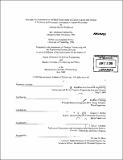Strategies for demonstration and early deployment of carbon capture and storage : a technical and economic assessment of capture percentage
Author(s)
Hildebrand, Ashleigh Nicole
DownloadFull printable version (34.61Mb)
Other Contributors
Massachusetts Institute of Technology. Technology and Policy Program.
Advisor
Howard J. Herzog and Gregory J. McRae.
Terms of use
Metadata
Show full item recordAbstract
Carbon capture and storage (CCS) is a critical technology for reducing greenhouse gas emissions from electricity production by coal-fired power plants. However, full capture (capture of nominally 90% of emissions) has significant impacts on the technology, plant performance, and project economics that represent challenges for the first movers who implement the technology. This work finds that capturing only part of the emissions (i.e., partial capture) can facilitate implementation compared to full capture. Partial capture is easier to implement technologically, resulting in lower risk. To investigate plant performance and economics as a function of capture percentage, spreadsheet models were developed for both pulverized coal (PC) and integrated gasification combined cycle (IGCC) plant technologies. Compared to full capture, partial capture can preserve efficiency, and thus ability to dispatch electricity to the grid, thereby reducing the risk of stranding and ensuring that emissions reduction will occur. For a PC plant, the cost savings associated with partial capture are significant, and a reasonable mitigation cost ($/ton of avoided emission) is maintained. This makes partial capture for PC more implementable than full capture, and a strategy of partial capture, especially for demonstrations, will accelerate commercialization of post-combustion capture. For an IGCC, the cost savings are relatively small, and there is a mitigation cost penalty associated with partial capture. The decision between full capture and partial capture for IGCC requires a trade-off of various technological and economic priorities. Due to the cost and challenge of implementing IGCC base technology, a strategy of partial capture is unlikely to accelerate commercialization of pre-combustion capture. However, partial capture strategies will assist in maintaining a robust electricity sector compared to the alternate situation of fuel-switching from coal to natural gas. This can occur through a diversified portfolio of options for technologies and fuels, consumer protection, and reduced risk of carbon lock-in.
Description
Thesis (S.M.)--Massachusetts Institute of Technology, Dept. of Chemical Engineering; and, (S.M. in Technology and Policy)--Massachusetts Institute of Technology, Engineering Systems Division, Technology and Policy Program, 2009. Includes bibliographical references (p. 116-122).
Date issued
2009Department
Massachusetts Institute of Technology. Department of Chemical Engineering; Massachusetts Institute of Technology. Engineering Systems Division; Technology and Policy ProgramPublisher
Massachusetts Institute of Technology
Keywords
Chemical Engineering., Technology and Policy Program.